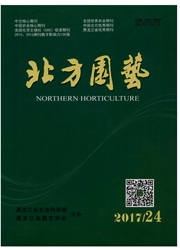

 中文摘要:
中文摘要:
以鲜食番茄品种‘欧亚多’种子和幼苗为试材,对种子进行不同浓度(0.05、0.10、0.50、1.00、1.50mmol/L)SNP(NO供体硝普钠)浸泡后进行低温(18±1)℃处理;对幼苗施用不同浓度(0.1、0.5、1.0、1.5mmol/L)的SNP并进行低温(12±1)℃/(8±1)℃处理,以研究外源NO对低温胁迫下番茄种子萌发和幼苗生长的影响。结果表明:0.05、0.10mmol/L的SNP处理提高了低温胁迫下番茄种子的发芽率、发芽势、发芽指数和活力指数,其中0.05mmol/L的SNP处理效果最好;施用不同浓度SNP(0.10~1.00mmol/L)可不同程度地缓解低温对番茄幼苗的株高、茎粗、叶片数、鲜重、干重及根系活力的抑制,其中0.50mmol/L的SNP处理对根系活力影响效果最好,其余指标为1.00mmol/L的SNP处理效果最好。
 英文摘要:
英文摘要:
Taking the processing tomato cultivar‘Ouyaduo’as material,different exogenous sodium nitroprussid(0.05,0.10,0.50,1.00,1.50 mmol/L)on tomato seed under low temperature(18±1)℃ and different exogenous sodium nitroprussid(0.1,0.5,1.0,1.5mmol/L)on growth of tomato seedling under low temperature(12±1)℃/(8±1)℃ were used in this experiment,to study the effects of exogenous NO on tomato seed germination and growth of tomato seedling.The results showed that SNP of 0.05 and 0.10mmol/L could increase tomato seed’s germination rate,germination energy,germination index and activity index,the optimum concentration was 0.05mmol/L SNP of 0.10-1.00mmol/L differently alleviated the restrain of height,thickness,number of leaves,fresh and dry weight and root activity on growth of tomato seedling,the optimum concentration of SNP for root activity was 0.50 mmol/L,other indexes were1.00mmol/L.
 同期刊论文项目
同期刊论文项目
 同项目期刊论文
同项目期刊论文
 期刊信息
期刊信息
